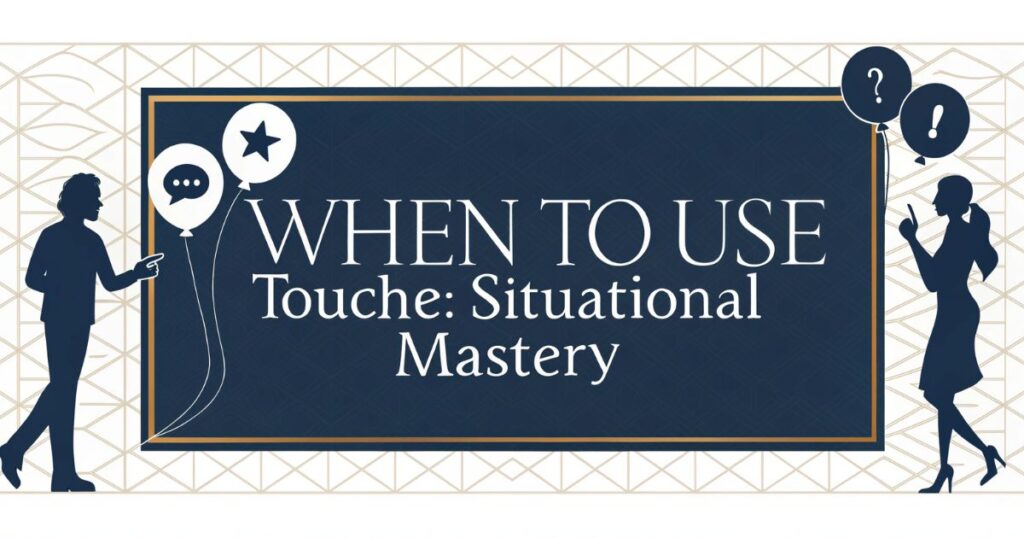Ever wondered why touché carries such conversational weight? This elegant French expression transforms ordinary debates into sophisticated exchanges. Mastering its proper usage elevates your communication from amateur to artful.
The Fascinating Etymology: From Swordplay to Wordplay
The word touché springs from medieval French “toucher,” literally meaning “to touch.” Picture Renaissance dueling masters acknowledging when an opponent’s blade found its mark.
This fencing terminology crossed into intellectual combat centuries ago. When your verbal opponent scores a point, you gracefully concede with the same word swordsmen used to acknowledge defeat.
What Does Touché Really Mean? Beyond the Basics
Touché represents far more than casual agreement—it’s intellectual surrender with style. You’re acknowledging your opponent delivered a clever comeback that genuinely impressed you.
The expression demands authentic admiration for wit, not mere politeness. Think of it as saying “your comeback was so brilliant, I must tip my hat to you.”
Perfect Pronunciation Guide for Americans
The correct pronunciation is [too-SHAY], never “tush” or “touch-ee.” That final syllable carries a crisp, confident emphasis that commands respect.
Most Americans stumble on the French accent. Practice the “ay” sound like you’re saying “day” but shorter and more precise.
When to Use Touché: Situational Mastery

Touché thrives in witty exchanges, intellectual debates, and moments requiring graceful concession. It’s perfect when someone turns your own logic against you brilliantly.
Avoid using it in casual conversations about mundane topics. Reserve this linguistic gem for moments that genuinely warrant sophisticated acknowledgment.
Real-World Examples: Touché in Action
During the 2012 vice presidential debate, Joe Biden’s quick wit prompted several touché moments from political commentators. His sharp responses to policy critiques demonstrated perfect timing.
Social media influencer exchanges often feature viral touché moments. When someone cleverly counters a tweet with undeniable logic, followers respond with admiring “touché” comments.
Cultural Nuances: American vs. International Usage
British speakers tend to use touché more frequently than Americans, often in casual conversations. Their comfort with borrowed French expressions reflects centuries of linguistic cross-pollination.
Americans typically reserve touché for special occasions, treating it like fine wine rather than daily vocabulary. This restraint actually enhances its impact when properly deployed.
Common Mistakes Americans Make
Overusing touché transforms this elegant expression into annoying verbal tic. Save it for genuinely impressive comebacks, not every minor point your conversation partner makes.
Many people confuse touché with simple agreement. You’re not just saying “you’re right”—you’re acknowledging brilliant verbal maneuvering that caught you off-guard.
Alternatives and Synonyms: Expanding Your Vocabulary
“Well played” captures similar sentiment with more casual American flavor. “Fair point” works when you want acknowledgment without the theatrical flair.
“Got me there” offers informal recognition of clever comeback. “Point taken” provides professional alternative for workplace discussions requiring diplomatic concession.
The Psychology Behind Touché: Why It Works
Neuroscience research shows graceful concession triggers positive responses in both speaker and listener. Acknowledging superior wit builds mutual respect rather than resentment.
The borrowed linguistic authority of French adds gravitas to your concession. You’re not just admitting defeat—you’re demonstrating sophisticated cultural awareness.
Modern Usage Trends: Digital Age Evolution
Social media platforms have democratized touché usage across age groups. Twitter debates frequently feature this expression when users acknowledge particularly clever responses.
Meme culture has embraced touché as shorthand for “you win this round.” Gen Z and Millennials deploy it ironically and sincerely with equal comfort.
Mastering the Art of Elegant Concession
Touché transforms potential embarrassment into graceful acknowledgment of superior wit. Practice recognizing those perfect moments when your opponent deserves genuine linguistic applause. Remember—true sophistication lies not in never being bested, but in recognizing brilliance when it strikes.
FAQs
1. What does “Touche” mean in English?
“Touche” is a French word meaning ‘touched’, used in fencing when acknowledging a hit. In English, it’s often used to admit someone made a clever or valid point in a conversation.
2. Where did the word “Touche” originate?
It originates from French fencing terminology, where opponents say “touche” to acknowledge being struck. Over time, it entered everyday English as a witty conversational response.
3. How is “Touche” used in daily conversations?
People say “touche” to recognize a sharp remark, comeback, or correction—usually with a playful or respectful tone. It signals agreement that the other person’s point was well made.
More Posts
Perdition Meaning: The Complete Guide to Understanding and Use
ETA Meaning: Exploring Its Importance in Different Contexts
1111 Meaning: Angel Number 1111 and the Idea of Pause

Welcome to Brightnis! I am the admin and creator of this platform. I love questioning ideas and exploring different situations. My goal is to encourage critical thinking and help people see things from new perspectives. Join me in discussing thought-provoking topics and finding unique solutions to everyday challenges!






